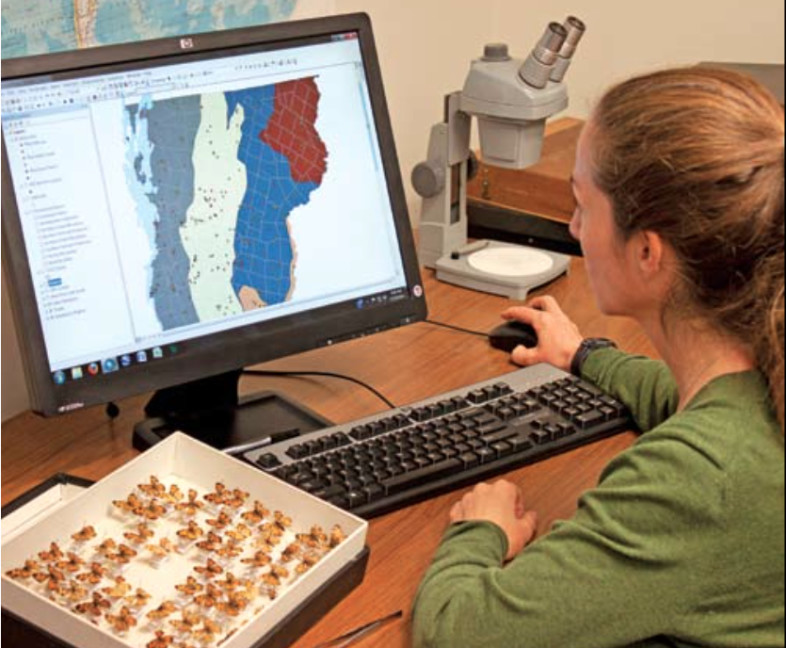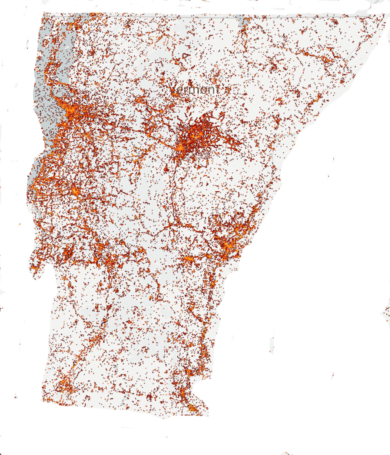
Digitizing Vermont butterfly records.
In July, the Global Biodiversity Information Facility (GBIF) surpassed 1 billion species occurrence records with at least one record for over a million species. The milestone symbolizes a major collective achievement, one made possible through the work of the GBIF network, a diverse partnership of more than 1,200 public and private organizations from 123 countries, including the Vermont Atlas of Life (VAL) here at the Vermont Center for Ecostudies (VCE).
GBIF is an international network and research infrastructure funded by the world’s governments and aimed at providing anyone, anywhere, open access to data about all types of life on Earth. Coordinated through its Secretariat in Copenhagen, the GBIF network of participating countries and organizations, working through participant nodes, provides data-holding institutions around the world with common standards and open-source tools that enable them to share information about where and when species have been recorded. This knowledge derives from many sources, including everything from museum specimens collected in the 18th and 19th century to geotagged smartphone photos shared by amateur naturalists in recent days and weeks.
Through the Vermont Atlas of Life, with the help of over 7,000 citizen and professional scientists we’ve contributed nearly 4 million occurrence records to GBIF, with tens of thousands more to be shared via our ongoing crowd-sourced citizen science projects and other datasets such as the Vermont Breeding Bird Atlas, the Vermont Butterfly Survey, Vermont Dragonfly Atlas, and the Vermont Bumblebee Survey through our new GBIF Integrated Publishing Toolkit server.
An unequalled resource for research
GBIF’s global occurrence index provides an unequalled evidence base for informing scientific research and policy through its support of ‘big data’ analyses. On average, nearly two peer-reviewed research papers appear each day that rely on data accessed through GBIF.org, for example, to illuminate our planet’s evolutionary history or to generate models that seek to understand the impact of rapidly changing conditions for life on earth. However, the findings are not limited to research and management topics around species conservation and protected areas or risks from alien and invasive species—they explore how we can improve food security by conserving the wild plants that are related to important crops, where to target monitoring of human diseases given changes in the distribution of the animals that carry them, and why the benefits and services that nature provides our communities hinge on biodiversity.
“Investments by several dozen national governments over the past 15 years have enabled the GBIF network to produce a high-performance platform for sharing biodiversity data freely, publicly and openly,” said Dr Tanya Abrahamse, founding CEO of SANBI, the South African National Biodiversity Institute, and current chair of the GBIF Governing Board. “But equally importantly, the infrastructure comes with a highly effective and worldwide community of practice. The individuals participating in GBIF’s intercontinental collaborations generously transfer their skills and knowledge to enable ever-wider access to data relating to life on Earth.”
Recent and ongoing improvements to the network’s underlying technology platforms have produced a high-volume, near-real time infrastructure prepared to build on GBIF.org’s rapid recent growth to deliver even greater and richer quantities of biodiversity information in the years to come. These enhancements proved timely, given that users of GBIF.org downloaded more than 845 billion records in 2017—a 200% increase in the data delivered the previous year. GBIF fully expects this total to cross the 1 trillion mark in 2018, another symbol of the infrastructure’s maturity.
GBIF’s global infrastructure yields researchers valuable savings and efficiencies by enabling them to search information from hundreds of collections and databases worldwide. The community itself also provides increasingly important services by investing labour into open-source tools for data sharing and access, like the Living Atlases platform, open-source software originally developed for the Australian government by the Atlas of Living Australia and now in use or under development in dozens of countries covering every region of the world, and here at VCE for the Vermont Atlas of Life.
“If we want to address the big challenges we face around the future of land use, conservation, climate change, food security and health, we need efficient ways to bring together all the data capable of helping us understand the changing state of the world and the essential role that biodiversity plays at all scales.” said Donald Hobern, Executive Secretary of GBIF. “This milestone shows that today’s GBIF is prepared for continued growth and ready to handle the massive volume of data we expect to see from other new technologies and sources, including environmental sequencing and remote sensing.”
What lies ahead
Although reaching 1 billion records is a significant milestone, much work remains to be done, including expanding the partnerships needed to link sources of biodiversity data not yet connected through the GBIF network. To this end, GBIF.org provides a ready-made framework for helping countries and organizations to fill gaps and biases in geographic, temporal and taxonomic coverage of biodiversity information. Here in Vermont, VCE stands ready to help anyone that would like to contribute data via the Vermont Atlas of Life.
Naturalists, explorers and scientists have documented life around the world for centuries. Open biodiversity data served through the GBIF network repatriates evidence about species gathered from field expeditions and held in natural history collections around the world, unlocking it through digital access for use by researchers and citizens worldwide including the countries of origin.
The use of standardized data formats and licences on GBIF.org eliminate guesswork and uncertainty about the terms of both sharing and using open biodiversity data. The global index also incorporates an advanced system of linking data properly cited in research (example) to the datasets that supported to it (example), thereby ensuring that the institutions that share data (example) receive credit for their actions. GBIF also continues to support and advocate for data papers as a tool for ensuring that researchers gain accepted academic credit for their work to collect, curate and share freely accessible, interoperable and reusable data.


Wow!